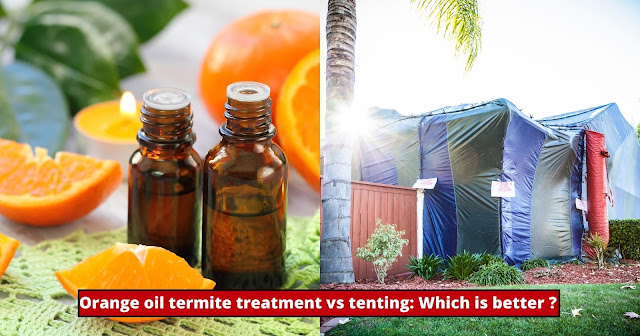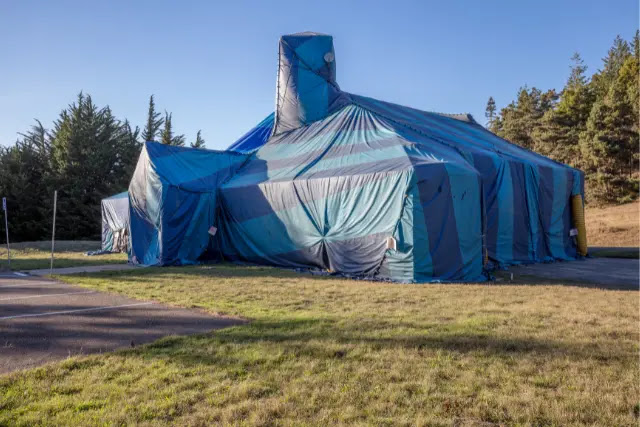When it comes to dry wood termites, there's no simple solution. That's why we recommend working with an experienced and qualified exterminator. They can evaluate the situation and determine what kind of treatment will be most effective in your specific case. They'll need to look at a lot of factors such as the type of termite, its location, how developed the colony is, etc. before deciding on the best course of action.
Termites can be a real pain! Not only do they feed on wood, which means they can eat through the foundation of your home or business, but it's hard to detect an infestation before it really takes hold. That is why prevention and treatment are so important if you want to protect yourself from these destructive pests. In this article we'll discuss orange oil termite treatment and tenting – two popular methods for treating termite infestations – so that you can make the best decision for your needs.
{tocify} $title={Table of Contents}
Orange Oil Termite Treatment
Orange oil products are a great way to get rid of termites without having to use harsh and toxic chemicals. The active ingredient in orange oil is called d-limonene, which is extracted from orange rinds. Because of its low toxicity, it has become a popular choice for many expecting safer pest control solutions. Not only is it used as a termite treatment but also as an ingredient in manufacturing resins, cleaning compounds, and perfume products!
If you have termite infestations, an orange oil treatment can be one of your best bet! This type of localized spot application targets each specific area and will only get rid of the termites in that particular area. The product is injected into any galleries present in the wood members, but the bonus feature is its ability to wick throughout the grain and pores! So even if there are areas otherwise inaccessible during a spot treatment, you may still be able to treat those with an orange oil injection.
The orange oil works by penetrating through the exoskeleton of the pest, thus killing them at the cellular level without leaving behind any hazardous residues or harmful chemical vapor that could be inhaled by people or animals.
If you're considering an orange oil treatment to get rid of dry wood termites, be aware that while it's effective, there isn't much of a residual effect. That means if the whole colony isn't reached, any surviving termites may end up moving somewhere else and starting another one. That's why it's important to ask about a warranty when looking into this type of treatment. This won't work for subterranean termite infestations though, so keep that in mind as well.
Tenting for Termite Treatment
Termites can spread by swarming and they could land in the most hidden parts of your building. That means, unless you take the time to properly inspect all areas, you won't even know there's an issue. Fumigation is typically used for dry wood termites – just like orange oil.
If you have a termite problem, tenting is an effective method of getting rid of the infestation. The process involves putting up tarps around your property to prevent any termites from entering or leaving, and then introducing an odorless and colorless fumigant gas to terminate them. Tenting has been used successfully to control all types of insect problems, so it can be very helpful in eliminating existing colonies as well as preventing future ones.
Using this form of treatment has many benefits. It treats all areas of your structure evenly without the need to drill any holes in walls or floors. It's also been popular among homeowners because it kills live bugs effectively, so they don't have to worry about their property becoming a long-term home for termites and other destructive parasites.
However, this method also comes with certain limitations. It costs a lot, mainly because you have to pay labor expenses as well as buy the special disinfection chemicals needed to make it safe for people to reoccupy the space. Additionally, occupants must evacuate their homes while the treatment is being applied due to health concerns related to potentially hazardous fumes.
Before an exterminator can do their job, it requires a lot of preparation and extra caution when the residents come back afterwards. Even so, if you want to get rid of pests fast, then investing in fumigation treatment may be worth it.
Comparison of Orange Oil and Tenting
The effectiveness of orange oil and tenting for termite treatment is quite similar, though there is some debate about which one works better. Orange oil treatments use a liquid mixture of d-limonene, an extract from citrus peels that acts as a natural insecticide, to directly kill the termites in contact with it. Tenting involves fumigation with gas toxic to pests like methyl bromide or Vikane to penetrate the whole building and affect all termites present inside. Depending on the severity of the infestation and other conditions, either could be more effective than the other. Professional pest control operators often make their recommendations based on their inspection.
With respect to cost, orange oil can definitely be seen as more economical when compared to tenting because its labor costs are lower due to shorter application time (usually between 1-2 hours). Tenting requires materials such as wood blocks used for ventilation holes and it takes longer application time – 4 days under normal circumstances. Plus, additional precautions for safety reasons like evacuating people during treatment period increase labor costs involved. Generally speaking, tenting tends to cost twice or three times what an orange oil job would run depending upon size of house & intensity of infestation.
When looking at environmental impact from each method, it's clear that both techniques have advantages and disadvantages. Orange oil is less harmful in terms of toxicity and odor than fumigant gases. On the other hand, fumigation has a much greater immediate effect eliminating all pests quickly but releases harmful chemicals into the air so proper clean up processes must follow its application or else it can affect health as well. Ultimately your decision for termite eradication should take into account the risks involved versus the relative benefits associated with each option. Keep in mind your end goal - a safe home environment.
Which is better?
It really depends on how severe your termite infestation is, what your budget is, and what you prefer. If the infestation isn't that bad and you want a more environmentally friendly treatment, orange oil could work for you. But if there are lots of termites or you need something more thorough right away, tenting might be better suited to your situation.
Conclusion
If you think you might have termites, it's important to take action right away. They can cause a lot of damage to your property! There are two popular methods for dealing with them – orange oil termite treatment and tenting. Each has its own pros and cons so make sure to do your research before deciding which is the best for you.
Considering your termite situation, it seems like choosing between orange oil treatment and tenting is a tough one. Orange oil is eco-friendly and usually works well with mild infestations, but can be more expensive than tenting. However, tenting involves leaving the premises while toxic chemicals are used—something that you may not be okay with. Ultimately, it really depends on how much money you have to invest in this and the severity of infestation.
Also read :



